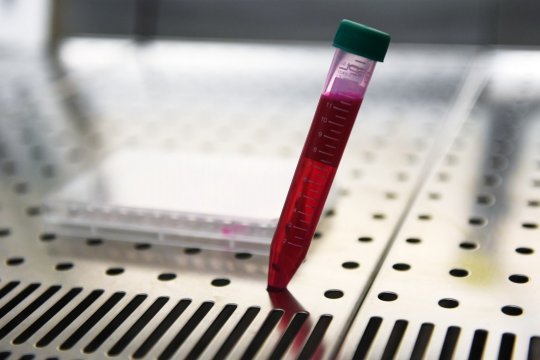Yehuda Shoenfeld, a renowned Israeli immunologist, now working at St. Petersburg State University, where he is heading a laboratory of autoimmunity mosaics, has shed light on the cause of coronavirus complications, namely a substance, whose extensive presence in the blood can result in death.
A St. Petersburg State University professor, an honorary professor at Tel Aviv University and a researcher at the Sheba Medical Center (Israel), Yehuda Shoenfeld, has determined that ferritin is a biomarker of a severe form of coronavirus infection, and that people with a high degree of ferritin present in their body are at risk of developing severe forms of COVID-19 infection, including when complications, such as bilateral pneumonia, start to develop.
“Ferritin is the protein responsible for the absorption of iron in the body,” says Yehuda Shoenfeld, the founder and head of the Autoimmune Disease Center. “Inside human body cells, ferritin serves as reserve storage of iron, binding free ions of iron, thus neutralizing its toxic properties and increasing solubility. If insufficiently present, it causes iron deficiency anemia. When in excess, however, it leads to hyperferritinemia.”
Hyperferritinemia, in turn, leads to impaired swallowing, weakness, decreased reproductive function, pathologies of the liver, heart and pancreas, neurological disorders, and vision problems. It occurs in severe cases of infectious diseases, including coronavirus infection.
Professor Shoenfeld’s team has been studying the hyperferritinemic syndrome for quite a while now, and has already published data on this condition. Sadly, in 50 percent of cases, patients do not survive.
According to Shoenfeld, an overabundance of ferritin in the human body may signal the organism’s response to infection, possibly to coronavirus as well. In case of viral diseases, ferritin is able to activate non-specific immunity cells, such as macrophages, which in turn, secrete cytokines. They sent a signal to other cells, for example, “commanding” them to initiate an inflammatory response and attack foreign agents. When the amount of cytokines is relatively small, it is good for the body, but when the amount becomes exceedingly high, this is fraught with a syndrome called the “cytokine storm” - one of the most dangerous complications of coronavirus infection. The body suffers a severe shakeup, resulting in a 50 percent mortality rate, with seniors and those with severe chronic diseases being at risk.
“As evident from studies made in China, the US and Italy, those infected with COVID-19 showed a high level of ferritin in their system. The increased content of ferritin is a marker indicating the appearance of pathogenic microorganisms inside the body. Our task is to understand how to quickly reduce the level of ferritin in the blood,” Yehuda Shoenfeld concluded.
Today, researchers working at St. Petersburg State University’s Laboratory of Autoimmunity Mosaics are looking for ways to reduce blood ferritin and use antibodies to block the synthesis of CD-143 cytokines, whose presence has been found to be a sign of a high likelihood of serious complications of COVID-19 disease. And most importantly, St. Petersburg State University is working on an anti-coronavirus vaccine based on the use of viral proteins as its main components.
“We are going to use viral proteins as a basic component of the medicine to create a vaccine,” Yehuda Shoenfeld says. “Viral proteins are not to be found inside the human body, which means that they cannot provide an unwanted immune response. The fragment is not rejected by the immune system, which is very inspiring,” he added.
Professor Yehuda Shoenfeld is an internationally renowned Israeli specialist in the study, treatment and prevention of autoimmune diseases, a physician, the founder and head of the Zabludowicz Center for Autoimmune Diseases at the Sheba Medical Center of Tel-Aviv University in Israel, and is President of the International Congress on Autoimmunity. He is editor-in-chief of Autoimmunity Reviews, IMAJ, Harefuah (Israel), co-editor-in-chief of the Journal of Autoimmunity and Autoimmunity Network, contributed to the work of the Israeli Medical Encyclopedia, and has organized over 20 international congresses on autoimmunity.
In 2016, this prominent scientist won a contest for mega-grants provided by the government of the Russian Federation for the promotion of scientific research. Since late-2016, Yehuda Shoenfeld has been heading St. Petersburg State University’s Laboratory of Autoimmunity Mosaics.
read more in our Telegram-channel https://t.me/The_International_Affairs

 12:00 28.04.2020 •
12:00 28.04.2020 •























